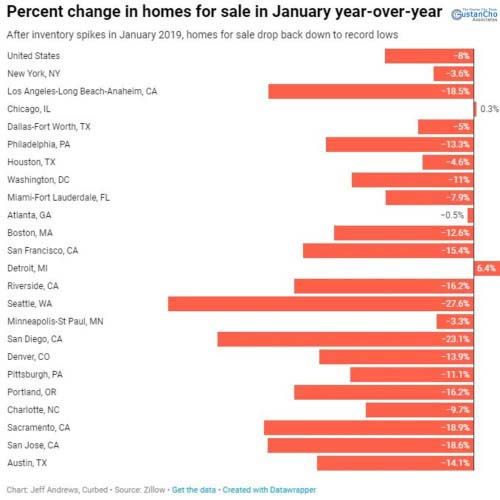BREAKING NEWS: How The Coronavirus Is Impacting The Housing And Mortgage Market
There is no doubt The Coronavirus Is Impacting The Housing And Mortgage Market.
- The housing market was rock-solid prior to the coronavirus pandemic hitting the United States
- Not only did we have a strong housing market, but the United States economy has been the strongest in history
- The Dow Jones Industrial Average hit an all-time historic high of 29,000 in February 2020
- Unemployment rates have hit an all-time historic low at under 3.5%
- Home values were increasing year after year with no sign of any correction or recession
- Due to rising home prices, both HUD and the FHFA had to increase FHA and Conventional loan limits for the past four years in a row
- The housing market was out of control
- There was more demand for homes than inventory
- A bidding war was common
- Mortgage companies brought back alternative financing mortgage programs such as bank statement loans for self-employed borrowers and non-QM loans
- Life was good in the U.S. Many hard-working Americans saw their 401k’s skyrocket over 50% since President Donald Trump took office three years ago
- Then the coronavirus hit the United States like a firestorm
- In a matter of a few weeks, the pandemic shut down the U.S. economy, left over 22 million Americans unemployed, tanked the stock market by over 30%, and shut down the country
- The pandemic has turned real estate and mortgage markets upside down
- The Coronavirus Is Impacting The Housing And Mortgage Market, but the amount of damage is not known
In this breaking news article, we will discuss and cover How The Coronavirus Is Impacting The Housing And Mortgage Market.
How The Coronavirus Is Impacting The Housing Market And Homebuyers In 2020
The coronavirus started in December 2019 in Wuhan China.
- The virus soon made it to the U.S. and spread like wildfire
- The U.S. economy came to an abrupt halt
- All non-essential businesses were forced to closed
- Most state governors issued a state of emergency in shutting their state’s down
- What this mean is all non-essential businesses remain closed
- All schools, parks, libraries, churches, and other places where gathers 10 or more people be remain closed
- Police, Fire, Hospitals, Groceries, Pharmacies, and other essential businesses and agencies are allowed to remain open
- The real estate and mortgage business is considered essential businesses so they are allowed to remain open
- So banks, mortgage bankers, mortgage brokers, appraisers, title companies, realtors, attorneys, and other third-party real estate-related vendors are allowed to remain open
- Social distancing guidelines were implemented on both the federal and state levels
- The housing market has taken a major toll
- The once strong housing market has been crushed overnight due to the coronavirus
- Many homebuyers with solid pre-approvals abruptly halted shopping for homes
Most homebuyers are more concerned about having a job in the days and weeks to come versus home values plummeting. Homeowners are worried about another housing collapse and meltdown like the 2008 financial crisis.
The Coronavirus Is Impacting The Housing And Mortgage Market: Can We Have Another Mortgage Crisis?
After the 2008 financial crisis, there were new mortgage regulations that were created and implemented.
- No doc mortgage loans have been wiped out and eliminated forever
- Bank statement loans for self-employed borrowers were completely out of the picture
- New rules and regulations were created on government and conventional loans
- The government eventually eased the lending guidelines on government and conventional loans so more renters can qualify for a mortgage and become first-time homebuyers
- Many mortgage companies have created and launched non-QM loans to help borrowers who could not qualify for government and conventional loans
- Bank statement loans for self-employed borrowers with no income tax return required were back and became very popular
- The coronavirus pandemic crisis halted all non-QM loans
- As it stands today, all non-QM loans are on hold by all lenders until further notice
- Many non-QM lenders went out of business already
The main reason why the mortgage markets are in major chaos is due to liquidity issues on the secondary mortgage bond markets. Investors have no interest in buying lower credit profile mortgage-backed securities (MBS). What this means is until further notice, there is no value for mortgages with borrowers with under 680 credit scores.
Home Sales Have Plummeted Due To Coronavirus Pandemic Impact On The Economy
Prior to the pandemic, the 2020 housing market was rock-solid and strong. However, after the coronavirus pandemic hit the Nation, many homebuyers have halted their home buying process due to economic concerns. The main reason homebuyers have put their home purchase on hold is due to concerns about their job stability.
Massimo Ressa of Gustan Cho Associates said the following:
FeThTThe spread of COVID-19—the disease caused by the novel coronavirus—was officially declared a pandemic by the World Health Organization on March 11. It’s already claimed more than 83,000 lives worldwide. Shelter-in-place orders have been issued for cities across the country and almost 10 million Americans have filed for unemployment since the outbreak of the pandemic.
Many are concerned with another housing market crash. Some experts are expecting a housing market collapse worse than the 2008 financial crisis. This holds especially true in areas where home prices have appreciated substantially like Florida, Texas, Arizona, Nevada, Georgia, and other high-demand housing states. Many states like Illinois and New York are financially strapped and may face bankruptcy. Illinois and New York had financial problems prior to the pandemic when the U.S. economy was strong.
Orders Of Social Distancing And Other Changes In Daily Behavior
The CDC has recommended social distancing effective immediately as a measure to avoid spreading the virus.
- Other measures include washing your hands with a coronavirus killer sanitizer
- The home buying and mortgage process can still continue if all involved use the proper methods from spreading the virus
- However, many homebuyers are worried about the housing market going through a housing crash just like Wall Street
- There are no vaccines for the deadly coronavirus as of today
- The Trump Administration has been transparent and aggressive in battling the coronavirus pandemic
- New cases are being discovered daily and the death toll numbers are increasing
- Government officials warned of increasing new cases as well as increasing death numbers before it gets better
- Many countries like Italy, many parts of Asia, and India have completed shut down the whole country and its President ordered a stay-at-home order
The coronavirus pandemic is beginning to affect the mortgage and lending markets which are beginning to have a toll on the housing market.
How The Coronavirus Is Impacting The Housing Market With Inventory Versus Demand
Prices go up when there is more demand than inventory.
- This has been the case with the housing market for the past several years
- This is the main reason both the Federal Housing Finance Agency (the FHFA) and HUD have been increasing loan limits on Conventional and FHA loans for the past four years
- Lenders also created and launched countless Non-QM mortgage programs which added fuel to the fire in getting more homebuyers to pull the trigger to purchase
- Many homebuyers and homeowners were not concerned about another housing bubble or a recession
- However, things changed overnight after the coronavirus outbreak in February
Aid By The Federal Government
One important factor that shows the promising outcome from the 2020 economic crisis versus the 2008 real estate and economic meltdown is the proactive actions of the Trump Administration. Obama did not help individual taxpayers and businesses as President Trump did. President Trump signed the $2.2 trillion coronavirus pandemic economic stimulus bill into law. Included in the bill, is setting up a moratorium on foreclosures, paying each American taxpayer $1,200, and helping businesses with stimulus money to keep workers employed. President Trump and his administration did damage control by creating a moratorium on foreclosures and offering forbearance to homeowners who could not pay their mortgages due to the pandemic. Homeowners can qualify for a forbearance up to 12 months. This forbearance on mortgages is for any mortgage backed by Freddie Mac, Fannie Mae, or the Federal Housing Administration (FHA). This law will prevent a flood of foreclosures and keep the bottom from falling out of the housing market, as happened in 2008. Unfortunately, this law hurts mortgage servicers because servicers still have to pay interest and principal to investors. Mortgage servicers also need to pay property taxes and insurance for borrowers with escrow accounts. Mortgage servicers may go out of business and/or file for bankruptcy if a flood of homeowners is taking up the offer of forbearances. It yet remains to be seen what the impact this law will have on the mortgage industry.
Changes In The Mortgage Industry Due To The Coronavirus Pandemic
The coronavirus pandemic has affected the mortgage markets. The $2 trillion stimulus package have hurt mortgage lenders. Included in the $2.2 trillion stimulus economic package is giving homeowners who got affected by the coronavirus pandemic become eligible for a mortgage forbearance up to 12 months. What this means is homeowners are exempt from making their mortgage payments up to one year. However, mortgage servicers are still on the hook to pay their investors the principal and interest payments. Servicers also need to pay property tax and insurance payments. Analysts expect over 25% of homeowners to take up on the forbearance offer. This can literally bankrupt many mortgage servicers. There is nothing in the stimulus package on how mortgage servicers will get funds to carry the period of the forbearance from borrowers.
See the chart below on the percent change in home sales for sale in January year-over-year:
The number of home listings literally dropped overnight after the pandemic hit the United States.
The Coronavirus Is Impacting The Housing And Mortgage Market: 2020 Housing Outlook Before And After The Pandemic
The 2020 housing market was stronger than ever prior to the pandemic. The 2020 housing market outlook was strong with analysts expecting a stronger market than 2019. A licensed Illinois realtor has been following the coronavirus pandemic impact of the housing market since the pandemic hit the U.S.
Again, most homeowners and homebuyers are mainly concerned about keeping their jobs so they can afford their homes. Home sales for 2020 are expected to drop significantly in the weeks and months to come. It is too early to predict the negative impact the coronavirus will have on the 2020 housing market.
Most Homebuyers Are On Hold To See How The Pandemic Has Affected The Economy
As mentioned earlier, most homebuyers who have suspended the homebuying process are due to concerns due to the economy and their jobs. Even though everyone needs shelter, Americans are concerned in buying a home and face foreclosure due to job loss. Over 24% of pre-approved homebuyers have suspended their home buying process due to concerns of future job stability. Many homebuyers are not too concerned about recessions. People still need shelter during severe recessions. Housing values do not plummet during recessions. It may drop or remain stagnant during periods of recessions, but in general, home values do not tank.
This is a developing story from Gustan Cho Associates. Gustan Cho Associates will keep our viewers informed as the story develops.










